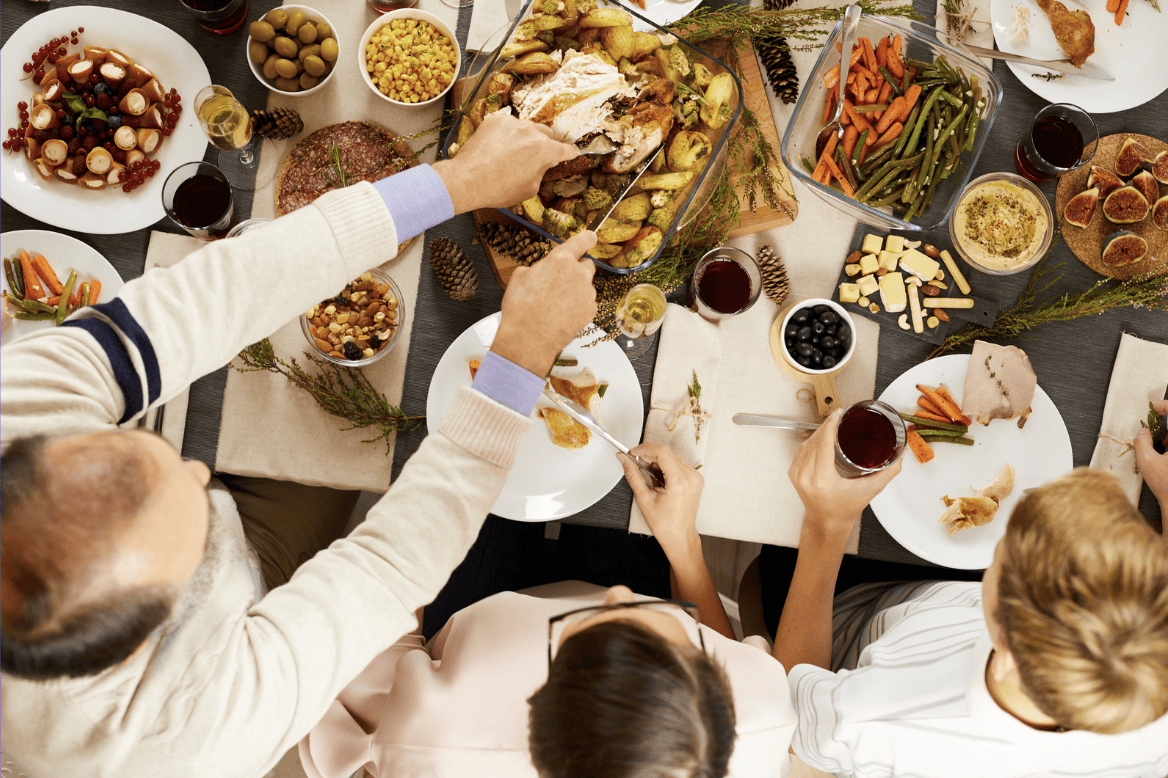How To Think About Holiday Eating
Charcuterie trays, decadent pies, dessert dishes, fancy cocktails…
The holiday season is synonymous with indulgent meals and tempting foods. With so many delicious treats surrounding us, finding balance and moderation during this time of year can be incredibly challenging.
The constant presence of indulgent foods makes it easy to overeat and sabotage your health and wellness goals. But with some intention, planning, and purposeful strategies, it’s entirely possible to enjoy the holidays while still working toward your overall well-being.
Adopting a mindful, intuitive approach to eating can make all the difference in navigating this season. You can make more conscious choices by understanding your personal mindset, motives, and behaviors around food. Creating an adaptive plan and implementing mindful eating strategies will allow you to enjoy the holiday season without regret or guilt. Honor traditions and satisfy cravings while feeling good in both mind and body.
Ready to learn how? Let’s get started!
Understanding The Mindset
The mindset we bring to holiday eating plays a major role in how we navigate this season. By cultivating awareness around our personal psychology and motivations, we can make more conscious choices.
Embracing Moderation Over Deprivation
Strict dieting or deprivation during the holiday season rarely works well and often brings guilt and shame. Willpower eventually runs out, and rebound overeating takes over. With so many social gatherings and treats available at every turn, restrictive eating often backfires.
It’s healthier and more sustainable to enjoy holiday foods in moderation. Completely restricting favorite foods tends to create what’s known as a “scarcity mindset,” which heightens cravings.
By practicing moderation 80% of the time and allowing more flexibility on special occasions, you can prevent reactive overeating when you finally give yourself permission.
Recognizing The Psychological Impact Of Holiday Eating
Holiday eating isn’t just about the food itself. Traditions, emotions, stress, and social pressures influence our eating behaviors. It’s important to reflect on how these factors affect you.
The memories made around the dinner table and the emotional significance of treasured recipes passed down can make it hard to resist grabbing extra helpings. Loneliness or family dynamics might also lead some to overeat or drink excessively. Mindfully examine these connections and use them as a foundation for making more thoughtful choices.
Planning For Success
With intention and forethought, we can plan and prepare for holiday eating in ways that support our health goals. By setting realistic expectations and creating flexible plans, we’re less likely to feel deprived or guilty.
Setting Realistic Expectations
It’s perfectly normal and expected to indulge in your favorite holiday treats. Beating yourself up after eating foods you’ve restricted all year helps no one, especially not yourself. Aiming for perfection almost always backfires.
Instead, focus on small, achievable goals around balance and moderation that feel sustainable. Slow and steady progress through iteration is much more sustainable than an all-or-nothing mindset. Give yourself permission to enjoy special occasion foods in sensibly portioned amounts. Allowing yourself to enjoy the foods you love in moderation will make you less likely to overeat later.
Creating A Flexible Holiday Eating Plan
Balance out the decadent, rich foods with healthier choices like veggies, lean proteins, fruit, whole grains, nuts, and seeds. Take the time to meal prep some vegetable sides in advance and cook at home when possible.
When you’re out grocery shopping, put produce and healthier swaps in your cart first, and then sparingly select a few treats. Having nutritious options on hand prevents you from arriving at a party when you’re starving and vulnerable to less healthy choices. Build your plate in the same way you build your grocery cart: veggies, lean meats, fruits, etc., and then treats. Follow your meal with a walk afterward to aid digestion.
Mindful Eating Strategies
Bringing mindfulness into our eating habits can make a significant difference in how we navigate holiday meals and treats. By tuning into our bodies natural signals and savoring each bite, we can find contentment with less.
Savoring Each Bite
Instead of mindlessly grazing, pause to truly taste, enjoy, and appreciate each flavorful bite. Slowly eating allows your brain to register fullness properly. Consider portioning a serving onto a plate rather than eating straight from the container when eating a holiday treat. Eating with intention and presence makes you feel satisfied sooner with less.
Listening To Your Body’s Cues
Check in with yourself periodically about physical vs. emotional hunger, fullness signals, and your personal energy needs. Pause before returning for seconds and ask yourself if you still feel hungry. Refrain from overstuffing yourself or eating past fullness just to finish what’s served. Adopt a flexible, intuitive eating approach tailored to your body’s wisdom vs. external rules.
Navigating Holiday Gatherings
With some strategy and flexibility, we can thoughtfully navigate the food-centric nature of holiday celebrations. By planning ahead and having responses ready for well-meaning others, we can strike the right balance for our needs.
Strategies For Holiday Parties And Events
Offering to bring a healthier dish you enjoy to share with the group can ensure you have a nutritious option to fill up on first before diving into treats. Socialize and mingle rather than planting yourself right next to the food table out of boredom. Chat in a separate room and drink water to curb mindless nibbling.
Handling Well-Meaning Food Pushers
When friends or family repeatedly encourage you to have more after you’ve politely declined, stand firm with your boundaries. Thank them for their generosity, but explain that you are satisfied with what’s on your plate. Remind them their cooking is delicious and you are enjoying the meal. You can partake in moderation while still achieving your health goals.
Managing Post-Holiday Guilt
If you overindulge during the holidays, beware of spiraling into guilt and shame. With self-compassion and mini goals, you can get back on track without self-criticism.
Overcoming Feelings Of Guilt And Regret
If you overindulge one day, avoid criticizing yourself or spiraling into shame. Instead, talk to yourself with kindness, compassion, and encouragement. Reflect on your choices to understand behaviors without self-blame. Consider what factors influenced your decisions without judgment. Learn and make a plan to get back on track. So long as you continue to iterate toward your goals, you can’t fail.
Reestablishing A Balanced Routine
While creating lofty New Year’s resolutions might be tempting, it’s time to take a different approach. Set mini health goals for January and consider joining a reset challenge for accountability and motivation. Incorporate activities you enjoy to boost your energy and mood. Unwind and practice self-care to relieve holiday stress. Prioritize sufficient sleep to heal your mind, body, and spirits.
Balance And Moderation: Fresh Tri Can Help
The holidays are about so much more than food alone. By adopting a balanced, mindful approach to eating, you can nurture a healthy relationship with food while fully enjoying this special time of year with loved ones.
Allow yourself to indulge thoughtfully on occasion without guilt. Savor favorite treats in moderation as part of treasured traditions. Relish the social connections and joyful celebrations that make the holidays meaningful.
With intention, self-awareness, and self-compassion, you really can strike a healthy, sustainable balance this season.
If you need more guidance and support, download the Fresh Tri app and gather with like-minded individuals as you iterate together toward lasting health and wellness.












